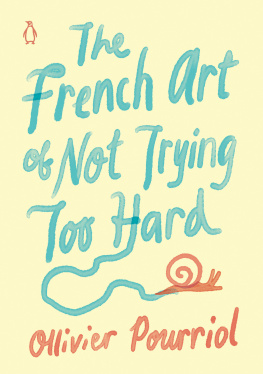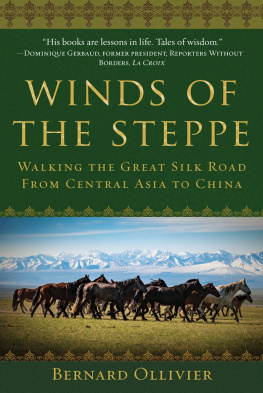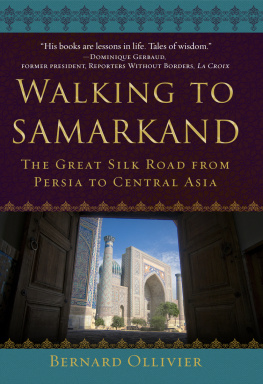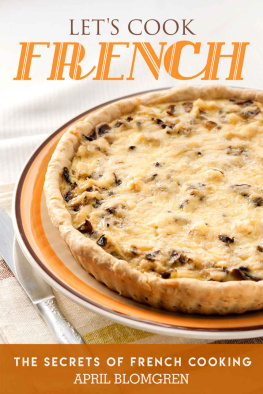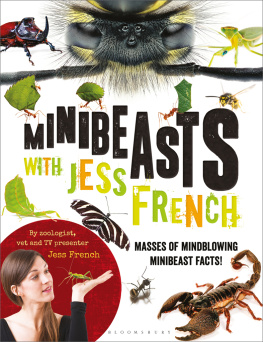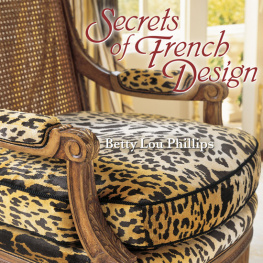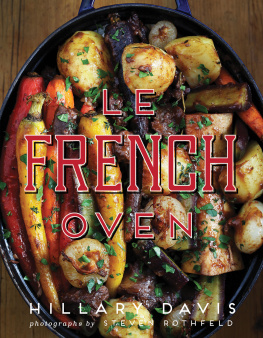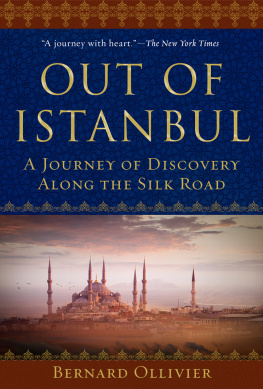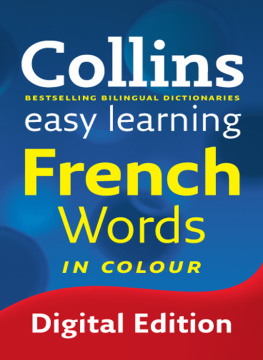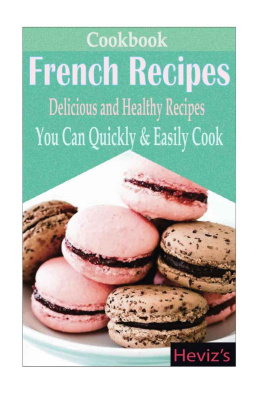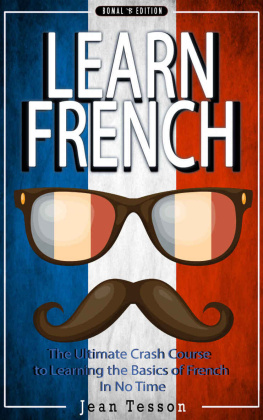Ollivier Pourriol - The French Art of Not Trying Too Hard
Here you can read online Ollivier Pourriol - The French Art of Not Trying Too Hard full text of the book (entire story) in english for free. Download pdf and epub, get meaning, cover and reviews about this ebook. year: 2020, publisher: Penguin Publishing Group, genre: Detective and thriller. Description of the work, (preface) as well as reviews are available. Best literature library LitArk.com created for fans of good reading and offers a wide selection of genres:
Romance novel
Science fiction
Adventure
Detective
Science
History
Home and family
Prose
Art
Politics
Computer
Non-fiction
Religion
Business
Children
Humor
Choose a favorite category and find really read worthwhile books. Enjoy immersion in the world of imagination, feel the emotions of the characters or learn something new for yourself, make an fascinating discovery.
- Book:The French Art of Not Trying Too Hard
- Author:
- Publisher:Penguin Publishing Group
- Genre:
- Year:2020
- Rating:3 / 5
- Favourites:Add to favourites
- Your mark:
- 60
- 1
- 2
- 3
- 4
- 5
The French Art of Not Trying Too Hard: summary, description and annotation
We offer to read an annotation, description, summary or preface (depends on what the author of the book "The French Art of Not Trying Too Hard" wrote himself). If you haven't found the necessary information about the book — write in the comments, we will try to find it.
The French Art of Not Trying Too Hard — read online for free the complete book (whole text) full work
Below is the text of the book, divided by pages. System saving the place of the last page read, allows you to conveniently read the book "The French Art of Not Trying Too Hard" online for free, without having to search again every time where you left off. Put a bookmark, and you can go to the page where you finished reading at any time.
Font size:
Interval:
Bookmark:
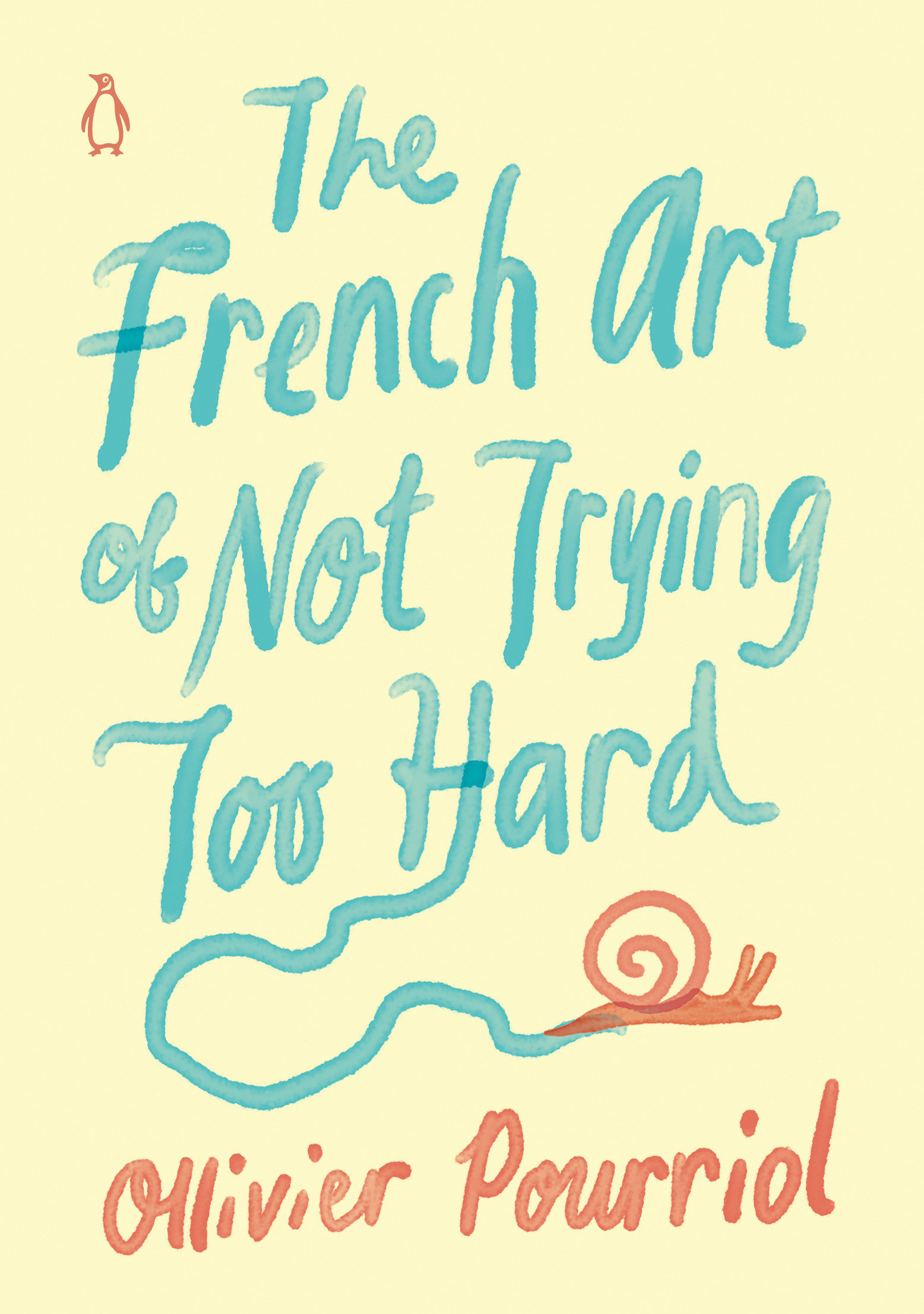
PENGUIN BOOKS
THE FRENCH ART OF NOT TRYING TOO HARD
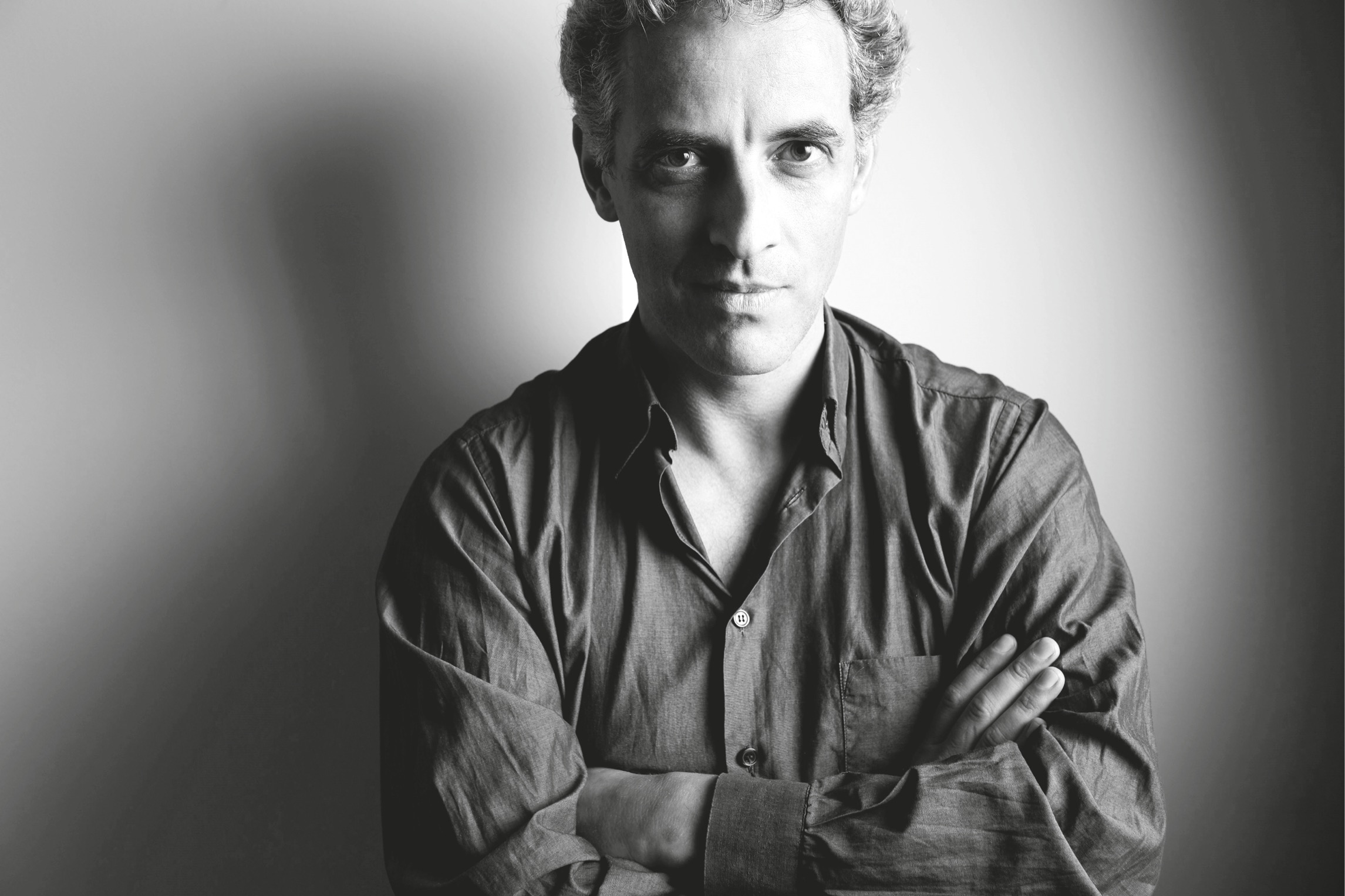
Julien Falsimagne
Ollivier Pourriol is a philosopher, writer, and novelist. He lives in Paris, where his lectures mixing philosophy and cinema are widely attended, and where he puts his ideas into practice over aperitifs with friends.
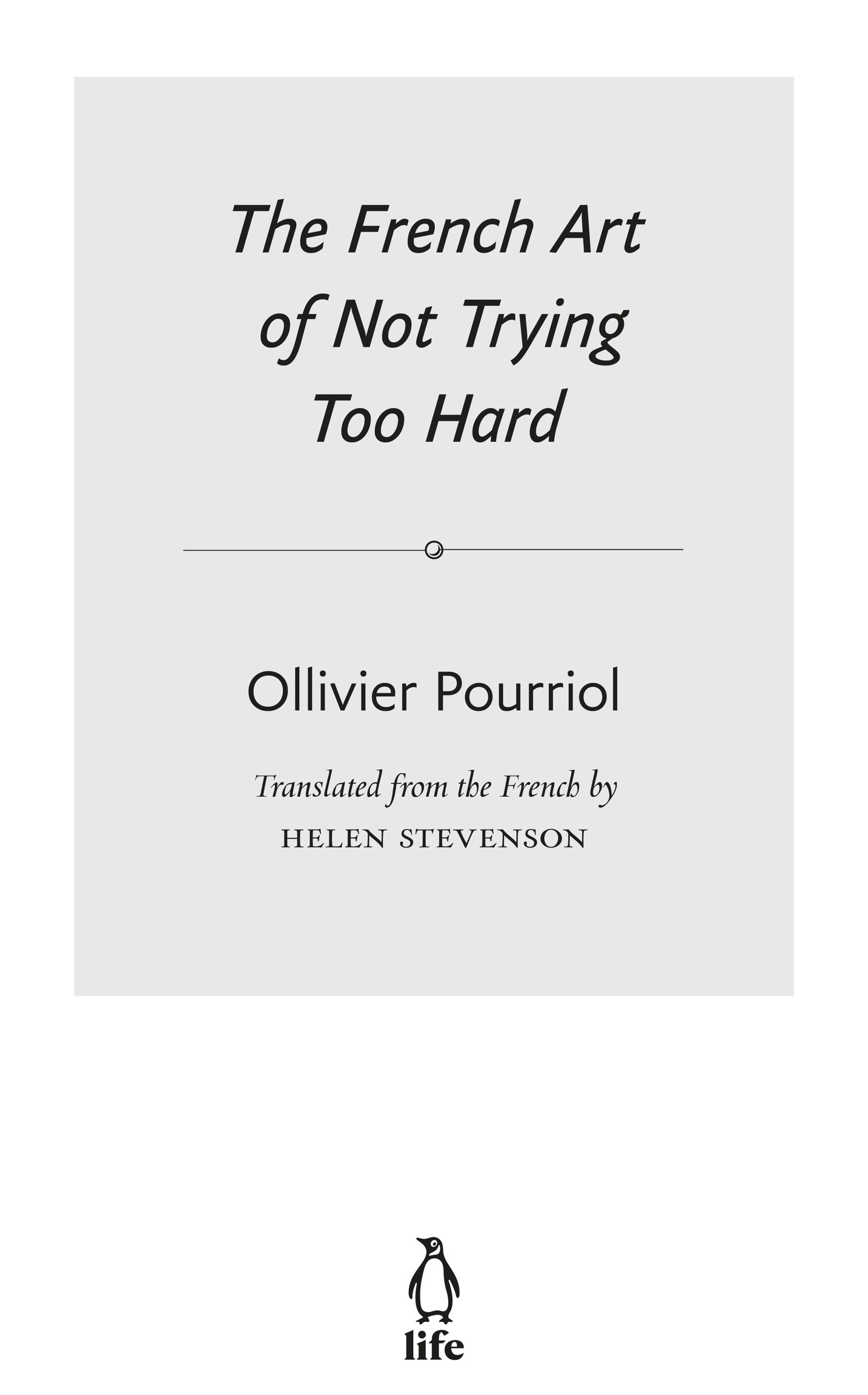
PENGUIN BOOKS
An imprint of Penguin Random House LLC
penguinrandomhouse.com
Copyright 2018 by ditions Michel Lafon
Translation copyright 2020 by Helen Stevenson
Penguin supports copyright. Copyright fuels creativity, encourages diverse voices, promotes free speech, and creates a vibrant culture. Thank you for buying an authorized edition of this book and for complying with copyright laws by not reproducing, scanning, or distributing any part of it in any form without permission. You are supporting writers and allowing Penguin to continue to publish books for every reader.
Originally published in French as Facile: Lart franais de russir sans forcer by ditions Michel Lafon, Neuilly-sur-Seine.
LIBRARY OF CONGRESS CATALOGING - IN - PUBLICATION DATA
Names: Pourriol, Ollivier, 1971 author. | Stevenson, Helen (Translator) translator.
Title: The French art of not trying too hard / Ollivier Pourriol ; translated from the French by Helen Stevenson. Other titles: Facile. English
Description: [New York] : Penguin Books, [2020] | Originally published in
French as Facile: Lart francais de reussir sans forcer by Editions Michel Lafon, Neuilly-sur-SeinePage facing title page. | Includes bibliographical references. |
Identifiers: LCCN 2020022658 (print) | LCCN 2020022659 (ebook) | ISBN 9780143135494 (hardcover) | ISBN 9780525507161 (ebook)
Subjects: LCSH: Stress (Psychology) | Struggle. | Relaxation. | Philosophy, French.
Classification: LCC BF575.S75 P67513 2020 (print) | LCC BF575.S75 (ebook) | DDC 650.1dc23
LC record available at https://lccn.loc.gov/2020022658
LC ebook record available at https://lccn.loc.gov/2020022659
Cover design by Jim Tierney
pid_prh_5.5.0_c0_r0
This book came about as the result of a conversation with my publisher and friend, Elsa Lafon. Its important to specify friend because we werent working at the time, we were just having dinner. It wasnt a professional discussion; I wasnt there to outline a project or negotiate a contract. It was just a conversation for conversations sake, over a simple family meal and a good bottle of wine. In fact, I cant even remember what we were talking aboutmaybe about the children, who were still running around and should have been in bed. What effort we expendedto no availtrying to get them to do what we wanted! Maybe it would have been best just to ignore them and wait for them to tire themselves out. Sooner or later theyd go to sleep. After all, that night was slightly special: there was no school the next day. What greater pleasure, for a child, than to end up falling asleep on the sofa, lulled by the adults conversation? Late to bed, happy to bedit makes for sweet memories. How right you are, Elsa said. Why struggle? Lets have another glass of wine.
A few minutes later the children were gently sleeping, through no effort on our part, without our even noticing. In the end it was easy, Elsa said. And I think thats when we started talking about it. Easewhat a marvelous subject. We always think we have to make a huge effort in order to get good results, that we have to suffer to be beautiful and must work hard for everything, whether its seducing someone, or learning to play the piano, or tennis, or to speak a foreign language. Even therapists talk about working on yourself, because we are taught at a very young age that everything must be earned, that effort brings just rewards, and that nothing comes from nothing. But I am convinced that the opposite is true. In certain cases, making an effort is not just useless, its actually counterproductive. No one ever became more beautiful by suffering, for example. Unless they love suffering for its own sake. Beauty rests rather on serenity, on tranquility, on being at peace with oneself. Im not saying theres no point in making any effort at all, but rather that there are some goals that can only be reached indirectly. By sincerely abandoning any attempt to attain them. Without aiming for them. In other words, easily. Seduction, for example: what could be less seductive than someone whos trying to seduce you? Its too directtheres no room for naturalness, or imagination. If you try, youre bound to fail. In fact, youve failed before youve even started. Its obvious: when youre trying to get someone to like you, you become clumsy, precisely because youre trying not to be. But the reverse is also truewhat could be more seductive than someone who isnt making a play for you, whos happy just to be, and do their own thing? Seduction is the art of succeeding without trying, without taking aim. Its a question of charm, really. In essence, its a foregone conclusion. And we know it. Either theres a magnetism between two people or there isnt. So why bother being shy, or paralyzed by your goal? There is no goal, no target to be hit, no mountain to be climbed.
Take cooking, for example. Think of the times youve been chatting away to a friend, enjoying yourself, and forgot to turn down the gas on the stove. Oh well, those onions will be nicely caramelized now. It even holds true for washing up: when you burn a pan the best thing is to let it soak, rather than to scrub at it like a maniac. Im not saying you should never scrub, but that you need to know when theres no point in scrubbing. Letting time do its work doesnt mean youll never do any yourself. It just means working more efficiently.
I love airport books, the kind you buy just before you get on a plane, that you read while looking out the window. Books you read out of the corner of your eye, but which imperceptibly change your way of seeing and behaving. Not quite philosophy, not quite journalism, nor personal development; more like a journalism of ideas, along the lines of Malcolm Gladwell. He gets interested in an idea, investigates it to see how it has changed peoples lives, and then writes an article or a book on it. If I had to write an airport book, Id write one about ease.
Elsa put down her glass. So when do we publish?
This book was born that day, out of a conversation that was going nowhere in particular, over a dinner between friends. It too was born out of the corner of someones eye, in keeping with its subject: easily. It wasnt a project, there was no effort to make, no prior intention, no one to convince, no negotiation. It was just perfectly obvious. Its the book youre reading right now. I hope it will fulfill its purpose in the same way as it came into being: without trying. And that you will find in the pages that follow the natural flow of the conversation that inspired it.
Its like it hasnt really started
ALBERTO GIACOMETTI
The hardest part is knowing where to begin. How to approach things? In what order? When youre talking to someone with a drink in your hand, these kinds of questions dont come up. You say what you have to say, in any old order. The conversation has always already started, and you just have to keep it going. But with writing, the moment you start, problems arise. Ill be honestIve rewritten this opening countless times. And each time Ive crossed it out and tried again. Everyone knows the story of Orpheus, the musician who goes down into the Underworld to rescue his wife, Eurydice. Like Orpheus with Eurydice, instead of moving forward, every time I started Id look back, and lose the very thing Id just snatched from the void. And yet in Orpheuss case, Hades, the god of the Underworld, had been quite clear: Orpheus, just this once, since you play the flute so nicely, I will let you bring your wife back from the kingdom of the dead, but on one condition, and one condition only: you must not turn around to look at her, not even once, till you are back in the light of day. Agreed? He couldnt have been any clearer. The contract included no small print. Everything was spelled out, even if the condition imposed was a bit strange. Why forbid Orpheus to look at his wife? Surely thats the kind of rule that cries out to be broken? Well indeed. But Greek myths are not just stories; they are infused with wisdom. And in this case the recommendation is clear: if you want to reach your goal, think of nothing else. Keep going, and dont look back.
Font size:
Interval:
Bookmark:
Similar books «The French Art of Not Trying Too Hard»
Look at similar books to The French Art of Not Trying Too Hard. We have selected literature similar in name and meaning in the hope of providing readers with more options to find new, interesting, not yet read works.
Discussion, reviews of the book The French Art of Not Trying Too Hard and just readers' own opinions. Leave your comments, write what you think about the work, its meaning or the main characters. Specify what exactly you liked and what you didn't like, and why you think so.

